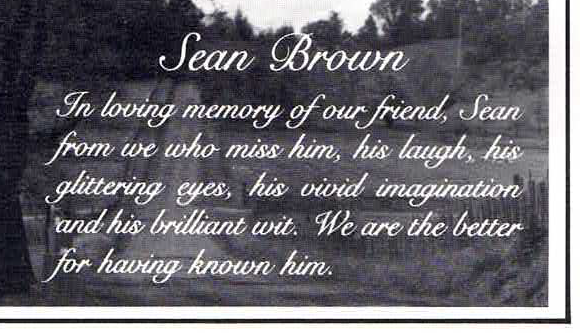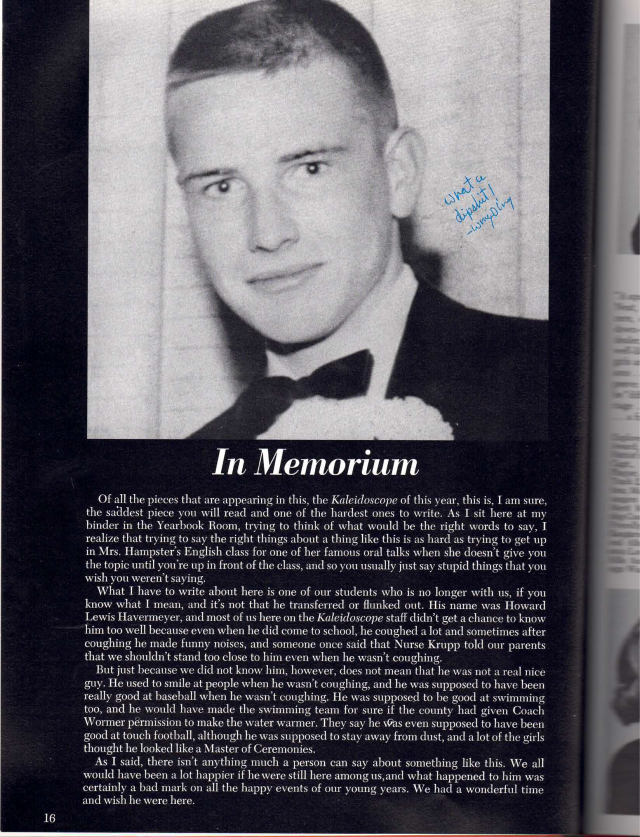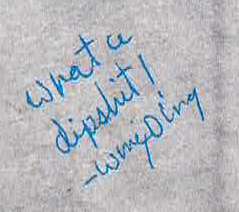Whenever I’m feeling particularly nostalgic or, as recently, severely melancholic, I get out my old high school yearbook from when I was a senior. In the words of Paul Simon:
Sonny sits by his window and thinks to himself How it's strange that some rooms are like cages Sonny's yearbook from high school Is down from the shelf And he idly thumbs through the pages Some have died Some have fled from themselves Or struggled from here to get there Sonny wanders beyond his interior walls Runs his hand through his thinning brown hair
My hair isn’t thinning, but the rest of the imagery is spot-on.
I looked at all the pictures from my classmates, remembering some of them, having absolutely no recollection of many of them, and essentially transporting myself back in time by nearly 40 years. I could write a variety of posts about my feelings as I went through the book, but most of them are so dark that it’s probably best I not even go there. Even as a young person, I knew that I would always look back on every moment of my life as an embarrassment (or worse), and I’m feeling too battered these days to wring out my emotional laundry for the rest of the world.
As I reached the end of the Seniors section, I noticed this little item in the lower right corner of the final page.

Now, I’ve written about my high school experiences before, including this epic post about one of the biggest assholes in the school (who, I’m pleased to report, died young). I don’t want to give the impression my years in high school were bad.
On the contrary, my sophomore, junior, and senior years were the happiest of my entire life, particularly because I was head-over-heels in love with a beautiful girl from another school who ultimately became my wife. I don’t think I’ll ever be that happy again. Not even close.
But let’s return our attention to the aforementioned, Sean Brown, whom the folks creating the yearbook lauded and celebrated. Let me tell you, here and now, every single one of those words is a giant crock of shit.
I remember Sean Brown. He was a very meek kid, and very awkward. He got teased and picked on relentlessly. He was considered the biggest loser in the school, and no bully spared him. His only friends were a handful of other weirdos (one of whom, Morrisa, was a friend of mine and whom I paid to illustrate my second book, since she was a talented artist).
I remember being in my family home one afternoon, and I was alone. The phone rang, and I went over to pick it up, and it was Morrisa. She was crying, catching her breath, and could barely get the words out. She told me that Sean had hanged himself in a closet, and he was dead.
I didn’t know Sean, and to be honest, I didn’t have much of a reaction to the news, although I tried to be sympathetic to Morrisa. She explained to me that it was an accident, and that he didn’t mean to kill himself. She said he had put foam around the rope to see what it felt like, but he didn’t really mean to do it. Even then, as a teenager, I didn’t believe her. She simply couldn’t accept the fact that Sean actually wanted to end his life.
Sean wasn’t mentioned in the days that followed. There were no grief counselors or announcements. It’s like it had never happened. Indeed, the only time it even came up was in that nauseating snippet from the yearbook.
If Sean had indeed been loved and celebrated, well, terrific, it all makes perfect sense. The truth, however, is that the student body treated him rotten, and he ended his life. For his peers to reference his “glittering eyes” and “brilliant wit” is disingenuous and offensive in the extreme.
I couldn’t help but be reminded of the National Lampoon High School Book Parody, which was ostensibly a portrayal of a 1964 yearbook (precisely 20 years before my own). In the Seniors section was this entire page, the text of which perfectly conveys precisely what I am talking about: everyone pretends to have liked The Dead Guy after he’s gone, even if they didn’t say one word to him when he was breathing.

The class clown in this parody, Wing-Ding Westheimer, brings a dollop of truth to the whole thing by way of this scribble:

Proving, once again, that humor is funny because it’s true.
I only wish there was more truth out there. For none of us need voices from the past claiming kindness when there was, in honesty, nothing but cruelty.

